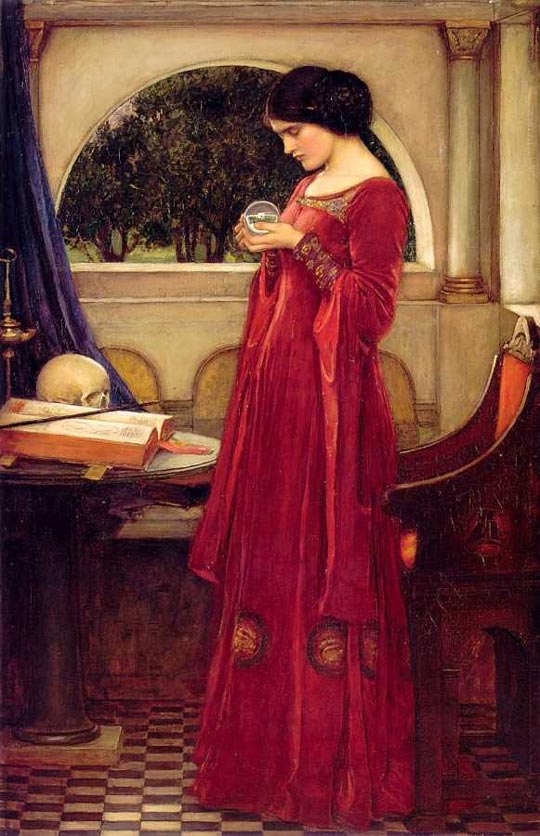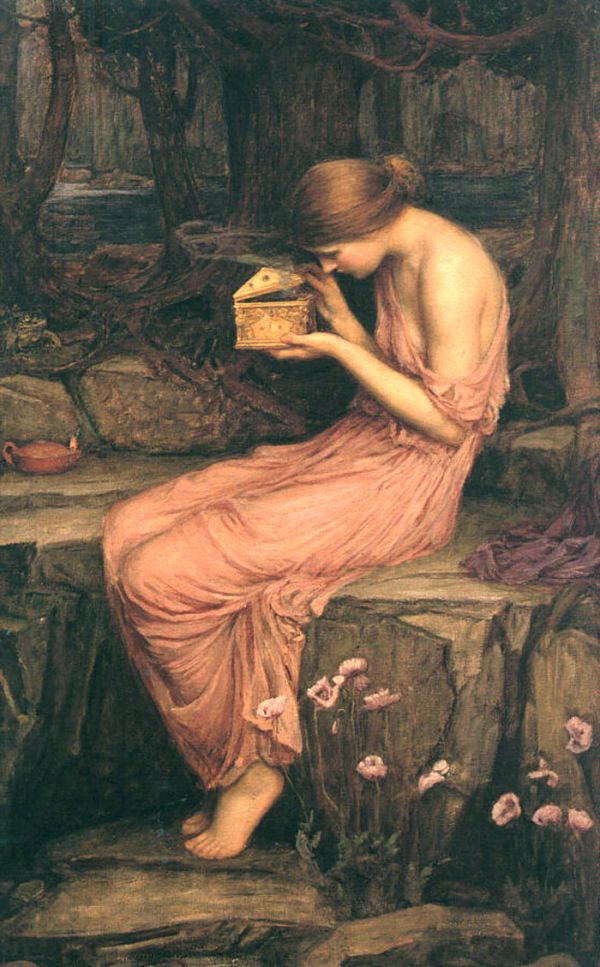There is no rule stating that fantasy literature must involve a pre-industrial setting, but Tolkien’s grip remains strong and the maps included at the beginning of epic fantasy novels illustrate a strong attachment to land rather than economic “development” (or degradation, as per Tolkien’s philosophy on modernity.) Pre-industrialization, by its very definition, eschews mass production and growth. Even in urban fantasy, the modes of production that sustain the magical world don’t usually involve factory processes. There are notable exceptions, of course, like Stephen King’s The Dark Tower series, but I think this description is a fair representation of the genre.
The role of “stuff” in fantasy fiction remains vitally important to fantastical stories and potentially serves to discipline fantasy readers into valuing certain cultural artifacts over others. Wikipedia has a page dedicated to a sizable—and incomplete— list of fictional swords with names. Certain artifacts are imbued with symbolic qualities (eg. King Arthur’s Excalibur and Holy Grail) and some magic systems are reliant upon material things (eg. wands in Harry Potter.) Though economic systems within fantasy literature are usually underdeveloped or neglected by authors, artifacts remain fetishized, used both as a way of adding authenticity to the secondary world (the presence of swords signals to readers that they are situated within a particular genre and provides a pathway for authors to play with certain tropes), and developing the protagonist’s identity. But from where does this economic model originate and how, if at all, does this conceptualization of stuff impact present-day nerd consumerism? Because while the role of economic exchange is left ambiguous in much fantasy literature, the centrality of stuff like wands, crystal balls, amulets, and named swords are not.
J R. R. Tolkien creeps into most discussions of fantasy literature, even when intentions are bent on his exclusion. China Mieville, both highly critical and highly thankful to the man, once called Tolkien “the big Oedipal Daddy” of fantasy literature, a label with which I’m forced to concur. Tolkien was heavily influenced by his academic work as a scholar of Anglo-Saxon literature, a research interest which inevitably shapes this discussion. He began writing The Hobbit shortly after translating the epic poem Beowulf. The dragon in The Hobbit is thought to be directly influenced by the epic poem. Tolkien’s work emulates Beowulf’s vagueness surrounding the production of goods, features similar rural mileus, and focuses more on treasure than merchandise. In his book Honour, Exchange, and Violence in Beowulf, Peter Baker writes:
[T]he world of Beowulf gets along entirely without coinage. The poem mentions land as a reward for valorous deeds, but land seems to lack all practical value: if noble Danes and Greats collect rents in money, food or service, the poet considers the fact too trivial to notice…Indeed, the only category of wealth that interests the poet and his characters is treasure.
The acquisition of treasure was done primarily through looting, and Baker writes that violence in Beowulf was not seen as a sign of social disintegration but as an ‘essential element in the heroic system of exchange (sometimes called the Economy of Honour.)’ In general, the accumulation of goods in fantasy literature is linked with the successful completion of good deeds. Part of the hero’s journey may involve a quest to recover certain items, yet the acquisition of stuff in fantasy literature is not about consumerism but a reflection of the protagonist’s righteousness or destitution. In Beowulf, for example, treasure is used to secure loyalty and ensure the continuation of a just society. Further examples include the destruction of the One Ring, the destruction of the Seven Horcruxes in order to defeat Voldemort and the search for the Deathly Hallows, and The Sword in the Stone– an object which arbitrates rightful inheritance to the throne.
Though not all fantasy settings are rural—and some fantasy authors focus on urban settings as a reaction to Tolkien’s idealization of pre-industrial life. Michael Moorcock, in particular, argued that Tolkien’s fascination with pre-industrialization was nostalgic and “infantile.”
Since the beginnings of the Industrial Revolution, at least, people have been yearning for an ideal rural world they believe to have vanished – yearning for a mythical state of innocence (as Morris did) as heartily as the Israelites yearned for the Garden of Eden. This refusal to face or derive any pleasure from the realities of urban industrial life, this longing to possess, again, the infant’s eye view of the countryside, is a fundamental theme in popular English literature.
Even in fantasy novels that feature urban environments, magical items are not produced through the methods of mass production. There aren’t too many wand-making factories. When large-scale manufacturing operations are displayed, they are usually situated as a site of oppression. Tolkien described the industrial period as “the robotic age,” despite early industrialization’s reliance on cheap sources of labour (women and children). The rejection of the methods of mass production is not unconscious on Tolkien’s part—Sarumon’s destruction of Fangorn Forest to pursue his own mining operation is portrayed as unabashedly evil. More recently, Brandon Sanderson’s excellent Mistborn trilogy features a covert mining operation controlled by an elite class that would like to restrict the use of magic (Sanderson’s magic system is fueled by minerals) and which is the site of class oppression and slavery.
I find the absence of economic preoccupation, which centers contemporary life but is pushed to the periphery in fantasy literature, fascinating. There’s stuff, but no theory about stuff. The acquisition of stuff is not usually related to the accumulation of wealth, but there’s no doubt that items incurred in fantasy novels are in some way special. They are unique snowflakes that arrive at key times in the plot, signaling growth in the character’s identity. (Think of Will, from Philip Pullman’s His Dark Materials trilogy, who grapples with moral challenges because he possesses The Subtle Knife.)
In particular, I wonder if the desire for nerds to own ‘limited edition’ consumer goods is related to the glamorization of items within fantasy worlds. Collecting limited edition ‘stuff’ has always been linked with nerd identity. Think of the cliched stereotype of the dweeb who collects mint-condition-never-removed-from-the-box-limited-edition Star Wars action figures and who can recite, in an encyclopedic fashion, their stats. These toys become a physical manifestation of one’s nerd identity. Similarly, the oohs and aahs towards those who manage to acquire ‘stuff’ from movie sets reveals a longstanding philosophy about authenticity: you got the real one. I’m not immune from the temptation of ‘rare artifacts.’ At last year’s San Diego Comic Con, I braved the Dark Horse line to purchase a limited edition (run of 1200, exclusive to Comic Con) House Stark Shield. And my views on Game of Thrones can, at the best of times, be described as ambivalent.
Of course, instead of monarchs awarding heroes with treasure, the fetishization of ‘rare’ artifacts in the primary world is mediated through private commercial entities. Limited edition consumer items are still products of capitalism–my Stark Shield was produced in a factory. (And so were the fantasy books…) Fantasy literature’s popularity is sustained by the very process it ignores or derides. ‘The capitalists’ (twirling mustache, top hat) have had no difficulty appropriating ‘items’ into the robotic age for nerds who view Comic-Con as a pilgrimage and the acquisition of special edition Lego as a quest.
But there’s anxiety within this relationship, a push-back because consumerism is just too easy. Mass production involves the masses, after all, and some fans argued that the whole-scale embrace of fantasy consumer goods is a form of appropriation rather than adoption. The former term, of course, implies an inauthentic masquerade on the part of the consumer. The latter term implies that the person is not an authentic member of the community. The perception is, perhaps, that these people are role-playing and will remove their nerd-drag once the sub-culture loses its mainstream appeal.??I cannot ignore the intersection of class and gender in this exchange. Anyone can enter a Target store and purchase a Star Wars t-shirt, but the ease of this purchase creates doubt in the wearer’s identity. Is this person really a ‘true nerd?’ Despite repeated calls for folks to quit patrolling the boundaries of nerdom, certain groups (mostly girls and women) are still required to justify their commitment to the community by, at times, being asked to respond to spontaneous pop-quizzes by self-appointed police officers of Kingdom Geek. Money functions as a good way to participate in a sub-culture that has long been defined by its rejection of irony and whole-scale enthusiasm of ‘cool stuff.’ A t-shirt from Target does not necessitate the grueling process (sarcasm—all that’s needed is more money) of purchasing a flight to a comic-con and waiting in line for several hours in hopes of acquiring limited edition whatever—the quest and the story related to the acquisition is removed, but the product is still worn as a symbol of identity, potentially allowing those with lower incomes (like young people and women) to participate in nerd sub-cultures.
Unfortunately, this participation has been met with a certain elitist attitude about what kind of labour or consumerism is good enough to qualify as being part of the community. Limited edition or not, it’s all capitalism. But to elitists, some capitalisms are better than other capitalisms. Consumerism is no longer enough because one must be a discerning consumer. And of course, testing the knowledge of other fans, often directed towards teenage girls, displays a kind of anxiety towards the opening of borders that has resulted from nerdiness’ capitalist expansion. Knowledge becomes another form of currency, the arbitrator between the high-brow collector of art and the dirty prol who can’t tell the difference between a first and second edition something-or-other.
All of which is to say that ‘fantasy economics’ has some serious real-life implications regarding inclusion, exclusion, and the powerful role of stuff/artifacts/things in identity creation. Fantasy has the potential for being highly critical of consumerism and contains the tools to imagine differently. Unfortunately, I do not think that most fantasy literature is currently engaged with these issues. Rather, pre-industrial economic practices provide convenient short-hands to indicate magic and swords—it’s a trope that some writers have confronted but most haven’t.
________
Images: John William Waterhouse, “The Crystal Ball With the Skull” and “Psyche Opening the Golden Box”
About the author: Sarah Shoker is a PhD candidate in political science at McMaster University in Canada. She’s currently completing a fantasy novel that is conspicuously absent of named swords, but she’d love you to publish it anyway. You can follow her on twitter @SarahShoker.


